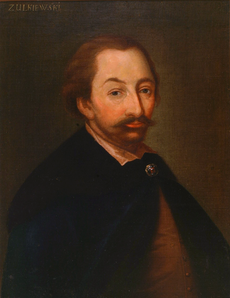Stanisław Żółkiewski
|
Hetman Stanisław Żółkiewski |
|
|---|---|
 
|
|
| Coat of arms | Lubicz |
| Consort | Regina Herburt h. Herburt |
| Issue | |
|
Full name
Stanisław Żółkiewski herbu Lubicz
|
|
| Family | Żółkiewski |
| Father | Stanisław Żółkiewski |
| Mother | Zofia Lipska h. Korczak |
| Born | 1547 Turynka near Lwów, Kingdom of Poland |
| Died | 7 October 1620 Battle of Cecora near Iaşi, Ottoman Empire |
Stanisław Żółkiewski (Polish pronunciation: [staˈɲiswaf ʐuwˈkʲɛfskʲi]; 1547–1620) was a Polish nobleman of the Lubicz coat of arms, magnate and military commander of the Polish–Lithuanian Commonwealth, who took part in many campaigns of the Commonwealth and on its southern and eastern borders. He occupied a number of high-ranking posts in the administration of the Commonwealth, including castellan of Lwów (from 1590), voivod of the Kiev Voivodeship and Great Chancellor of the Crown (from 1618). From 1588 he was also a Field Crown Hetman, and in 1613 was promoted to Grand Hetman of the Crown. During his military career he won major battles against Sweden, Muscovy, the Ottoman Empire and the Tatars.
Żółkiewski's best-known victory was against combined Russian and Swedish forces at the battle of Klushino in 1610, in the aftermath of which the Poles seized and occupied Moscow. He died in the 1620 battle of Cecora against the Ottomans, after allegedly refusing to retreat. Already renowned as a military leader, Żółkiewski's heroic death further boosted his fame. He is seen as one of the most accomplished military commanders in the history of the Polish–Lithuanian Commonwealth.
Stanisław Żółkiewski was born in the village of Turynka in 1547 to Stanisław Żółkiewski of the Lubicz coat of arms, voivode of Ruthenia, and Zofia Lipska. The exact date of his birth is unknown, and even the year is disputed: most sources agree on 1547, although a few suggest 1550.
...
Wikipedia
